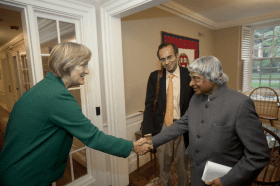By Tarun Khanna, Director of the South Asia Institute & Jorge Paulo Lemann Professor, Harvard Business School
This post was originally published on Linkedin.
The passing of the 11th President of India, APJ Abdul Kalam, has triggered an outpouring of affection. The so-called “missile man,” named after his former career as a scientist and researcher involved with India’s space and missile programs, was popularly also called the People’s President.
This outpouring prompted me to reflect on the two recent occasions I had to meet the man. The first was in the fall of 2011 at Harvard, when the South Asia Institute invited him to give our annual Mahindra Lecture to the community. Above is a photograph of the President meeting Professor Drew Faust, the President of Harvard (and I’m, rightly, in the background!).
During this visit, I remember several interactions between President Kalam and varied audiences at Harvard. We had asked whether he’d be willing to speak more than once, and I remember that he accepted with alacrity, none of the fuss that seems to come with celebrities. There was a public talk to the Cambridge community, the highlight of the visit available here.
He also gave a talk to gathered scientists from Harvard and MIT, including several world-leading lights, and held another evening discussion with the community of the Harvard Law School to which I took my then 11 and 9 year old kids. I remember my kids asking why there was no security. There was, but for an easily approachable person like President Kalam, the security somehow seemed to be an unobtrusive presence.
The second occasion I saw him was earlier this year at the 2015 Jaipur Literature Festival. I was sitting in yet another of his audiences, amongst lovers of the written word, where several hundreds, perhaps a thousand, were in raptures hearing him, more so than any other writer or celebrity gathered there.
Now, why did everyone respond to him thus – physicists and mathematicians, lawyers, writers, indeed everyman-and-everywoman? What accounts for this disarming ease of communication?
Mostly, his message was simple. In his Harvard talk, entitled “Empowering Three Billion,” he emphasized the importance of leadership, and kept returning to the idea that leadership was about being magnanimous, being compassionate, and creating an atmosphere where there was a win-win approach to problem solving. Not rocket science, this, even from the missile man. Yet, coming from someone who had accomplished so much, it did not degenerate into maudlin sentimentality. There was an air of authenticity.
He ended his public speech with a collection of statements. After each sentence, he made every Harvard eminence gathered there raise their hand – “repeat after me” echoing through the room – and take these vows: “Where there is righteousness in the heart, there is beauty in the character. When there is beauty in the character, there is harmony in the home. When there is harmony in the home, there is order in the nation. When there is order in the nation, there is peace in the world.”
Only Kalam could deliver such theatre; only he could leave us transfixed. Rest in peace!
SAI Harish C. Mahindra Lecture given by Dr. APJ Abdul Kalam, September 27, 2011, Harvard University from The South Asia Institute on Vimeo.

